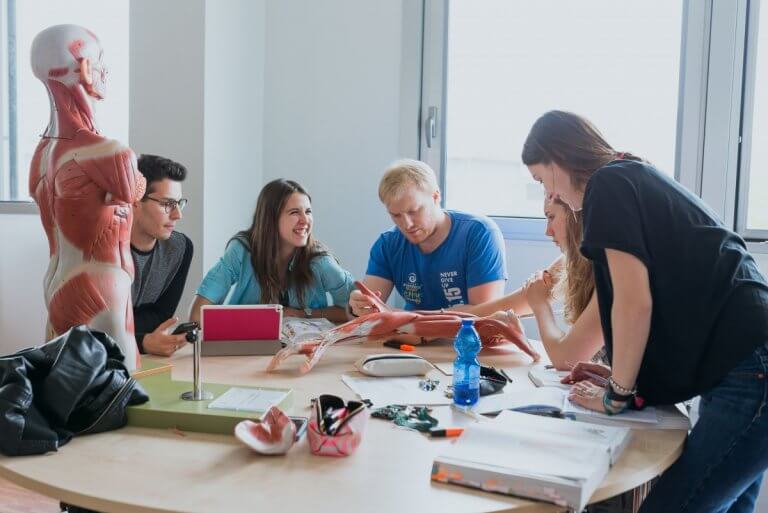
Do you have an interest in the medical or health sciences? An undergraduate or graduate qualification in the field can lead to global job prospects, as healthcare is a universal business, required in every country.
The demand for selected healthcare-related professions, including doctors and nurses, currently outstrip supply. A Doximity report in the US found a seven percent year-over-year increase in job growth, while the report’s lead author, Christopher Whaley, noted that factors driving the demand include an ageing population that requires more medical services and increases administrative tasks.
The United States’ Bureau of Labor Statistics projects that the demand for healthcare occupations will grow 18 percent from 2016 to 2026, and much faster than the average for all other occupations. Meanwhile, physicians, registered nurses and physiotherapists are also among the in-demand occupations in Canada.
With people living longer while our greying populations continue to grow, the need for medical professionals has never been more pressing.
While Milan in Italy is known as the world’s global capital for fashion and design, unbeknownst to many, it’s also home to a leading medical university that attracts talented students from all over the globe. Humanitas University – an international medical school located in the metropolis – is dedicated to the health sciences, affiliated with the internationally-renowned teaching hospital and research institute, the International students will be heartened to note that their six-year medical undergraduate programme is taught entirely in English by experienced professors and medical doctors from around the world, striving to prepare students for any career, be it clinical practice or research in Italy or abroad.
Approximately 40 percent of students here are foreigners who originate from over 25 countries worldwide. It’s a melting pot of culture and a unique study destination that blends modernity with heritage.
From theory to practice
Humanitas’ medical school ensures the right blend of theory and practice for all students. The course is characterised by a multidisciplinary, integrated teaching approach, and individual courses are grouped into modules, with a total of 360 credits and 29 examinations distributed across 12 semesters.
First-year medical students can expect interdisciplinary modules on theory, integrated with hands-on experience and simulation activities. Meanwhile, in their third year of study, students can access The Virgilio Programme, in which they develop a deep understanding of the link between basic and clinical research and combine patient care with biomedical research.
The programme allows students to gain 60 additional university credits through seminars, courses and laboratory activities while a team of mentors and tutors support students in all activities, including the preparation of their thesis and laboratory activities.
As students learn best through simulation, the university houses the Mario Luzzatto Simulation Center which offers students professional training to acquire the necessary professional skills to succeed in the field as it integrates theory with practice, as well as all healthcare professionals with different skill sets and specialisations.

Source: Humanitas University
Three prestigious entities in one institution
Gaining clinical experience is crucial to ensuring students are exposed to the right practical experiences. Hence, prospective medical students at the university can facilitate their learning and professional growth by working in one of the most important Italian hospitals and research centres for the clerkship in their third year of study.
Humanitas University is affiliated with the Humanitas Research Hospital – a highly-specialised teaching and research hospital. It’s the first general hospital to be quality-certified by the Joint Commission International and is considered by Harvard University to be one of the four most innovative hospitals worldwide. The Research Hospital has also featured as a case study in the Harvard Business Review.
Meanwhile, the Humanitas Research Centre is a renowned centre of excellence for research and treatment of immune system-related disease, from cancer to cardiovascular, inflammatory to autoimmune.
Here, innovative and active teaching methods complement student learning. The curriculum is enhanced by a wide range of active teaching methods and a student-centred approach (problem-based learning, case method, concept maps and simulated patients).
Global opportunities
Graduating with a medical degree from Humanitas can also open the door to work opportunities abroad.
The university offers the challenging US Medical Licensing Examination (USMLE) and prepares students from their first-year with specific courses that will help them with the test, enabling them to enter a speciality school in the US. Not surprisingly, Humanitas was recently approved by the California Medical Board, which means graduates can go on to work in the US. This makes them among the few foreign medical schools to be recognised in the US.
A total of 20 places are available for non-European students for 2019 admissions, while the admission test for international students will take place on June 24, 2019.

Source: Humanitas University
Humanitas also offers undergraduate programmes in nursing and physiotherapy, both of which are taught in Italian. This is in addition to postgraduate programmes, which includes a three-year PhD in Molecular and Experimental Medicine, fully taught in English.
So, if you’re keen to study medicine at an innovative, green campus in bustling Milan, Humanitas University may be the perfect fit.
Follow Humanitas University on Facebook, Twitter and Instagram
Liked this? Then you’ll love these…
Leading European universities for future medical professionals
Jumpstart your healthcare career at the Medical University of Gdańsk







